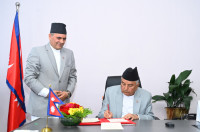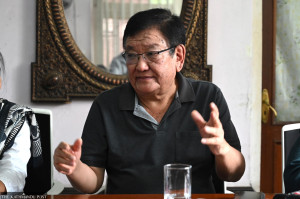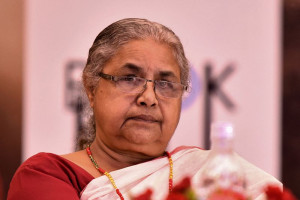Opinion
Entrenched politics
Ruling parties must focus less on bickering and more on constitution writing and development
Madhav Karki
In the second Constituent Assembly elections, almost all the major political parties made two promises to the Nepali people—a constitution within a year and all-round development. People overwhelmingly gave the governing mandate to the Nepali Congress (NC) and CPN-UML, perhaps because they were convinced by the parties’ manifestos of delivering on the twin agendas. However, the mandated parties have so far disappointed the people due to their obsession with power plays. Politics seems to have become the dominant agenda of the parties and as a result, both the constitution and the development agenda have gone on the backburner.
Lessons not learnt
The new prime minister has promised all round economic development and the finance minister has been promising rapid economic growth. But how they will deliver on their promises is not clearly spelled out, although a common minimum programme has been developed. Unless leaders focus on the agenda of constitution making and efficient, inclusive and sustainable development, they will once again disappoint the people. Only if both the ruling parties and the parties in opposition, along with those outside the current political process, make pledges to respect peoples’ mandate, can we expect positive results.
It is clear that our political parties have not learnt any lesson from their failures and are still putting individuals above the party and the party above the country. This was precisely the reason they were unable to deliver a constitution nor proper development in the last six years. Partisan politics does not seem to be limited to Kathmandu. It has afflicted entire institutions and the ethos and values of Nepali society down to the village level. Schools, colleges, user groups and cooperatives once run through peoples’ participation are now becoming dysfunctional.
Take, for example, the situation of some of raj kulos or local irrigation systems. Locally-managed kulos, which were built even before the Rana regime, were functioning well until political changes divided users along party lines. Thus, the age-old practice of ‘care and share’, guided by a culture of voluntarism, is no more. In the past, the collective work was considered an apolitical agenda and therefore, everyone contributed their labour voluntarily. But now, many such traditional practices have been discontinued since farmers too are divided along ideological lines and are reluctant to work under the leadership of persons who belong to different parties.
Stability and development
This was perhaps why the World Bank’s new country director Johannes Zutt called on Nepal to shift its focus from politics to the economy: “We want Nepal’s growth rate to stand at around seven to nine percent per annum and remain sustained at that level for a longer period”. The Bank’s call is timely and one hopes that the new government has taken these comments seriously.
Nepal’s economic growth during the last decade has been around a dismal 3.5 percent and inflation has remained high. This growth is perhaps the lowest among the Saarc member countries and the main reasons for this dismal performance can be attributed to political instability and frequent shutdowns. Trade deficits are soaring—a whopping Rs 1.6 billion a day—industrial growth is shrinking and agriculture production declining. The only bright spot has been the service sector, which has actually saved our economy from collapse by pumping in large amounts of remittance money by Nepali workers employed abroad.
This cushion, however, is temporary since many of the receiving countries are cutting down on their labour requirements. Therefore, the new government and its development organs have to rethink the current development policies and adopt the right paradigms and priorities if they really want to fulfil their promises to the people. “Nepal, more than anything, needs political stability and sustainable peace established as quickly as possible so that long overdue structural reforms can take place to tackle teething development challenges,” says a recent report by the International Monetary Fund. Addressing enduring sources of fragility, including financial sector consolidation, public financial management reform, investment climate improvement, and a strategy to address the gradual erosion of Nepal’s external competitiveness are among Nepal’s priority needs.
The Nepal Stock Exchange (Nepse) index has been showing daily ups and down according to the political barometer. Investors—both domestic and foreign—are closely watching the political situation before deciding on any long-term investment. Banks that are facing a liquidity crunch are praying for political stability so that public confidence is restored for more investment. Though all major political parties have made written and verbal commitments to allow investments and subsequent development, it seems their political compulsions prevent them from keeping their word. It is clear that the Nepali people want development to improve their lives and livelihoods. Their patience might wane soon if the parties disappoint them yet again. Therefore, it is paramount that our leaders read the writing on the wall. It is no good to simply come up with visionary manifestos and transformative plans; they need to be matched with suitable action.
Minimum development agenda
All the political parties need to first and foremost separate politics from the development agenda altogether and agree on a common national agenda to ensure both a constitution and economic development. Once agreed, they need to religiously follow it. A stable government is a prerequisite to improving the investment climate and accelerating development programmes, which means that no party should engage in the making and breaking of governments.
The country needs to develop a large pool of skilled human resources, clusters of enterprises and industrial zones. These will only be possible if financial institutions are assured of a return on their investment. This can create jobs for millions of unemployed youth who are forced to go abroad to do menial jobs as well as develop badly needed infrastructure.
The kind of efficient, inclusive and sustained growth that Nepal needs also requires the involvement of experts in planning, implementation and monitoring. But the country has a non-functional planning commission. Nepal’s National Planning Commission has been politicised, which has badly affected the quality of planning and implementation.
There is also an urgent need to mainstream environment and climate change issues in every development plan and programme, which requires multi-disciplinary knowledge and inter-disciplinary actions. Uncoordinated climate change adaptation activities have to be quickly rectified based on the commitments Nepal has made to the international community. Nepal’s future development pathways have to be charted on the trajectory of a green and sustainable roadmap. Perhaps minimising political strategising and maximising development thinking might help.
Karki is an environment and development specialist




 18.72°C Kathmandu
18.72°C Kathmandu










